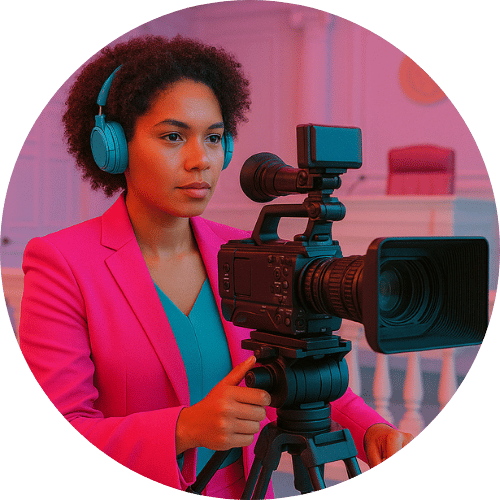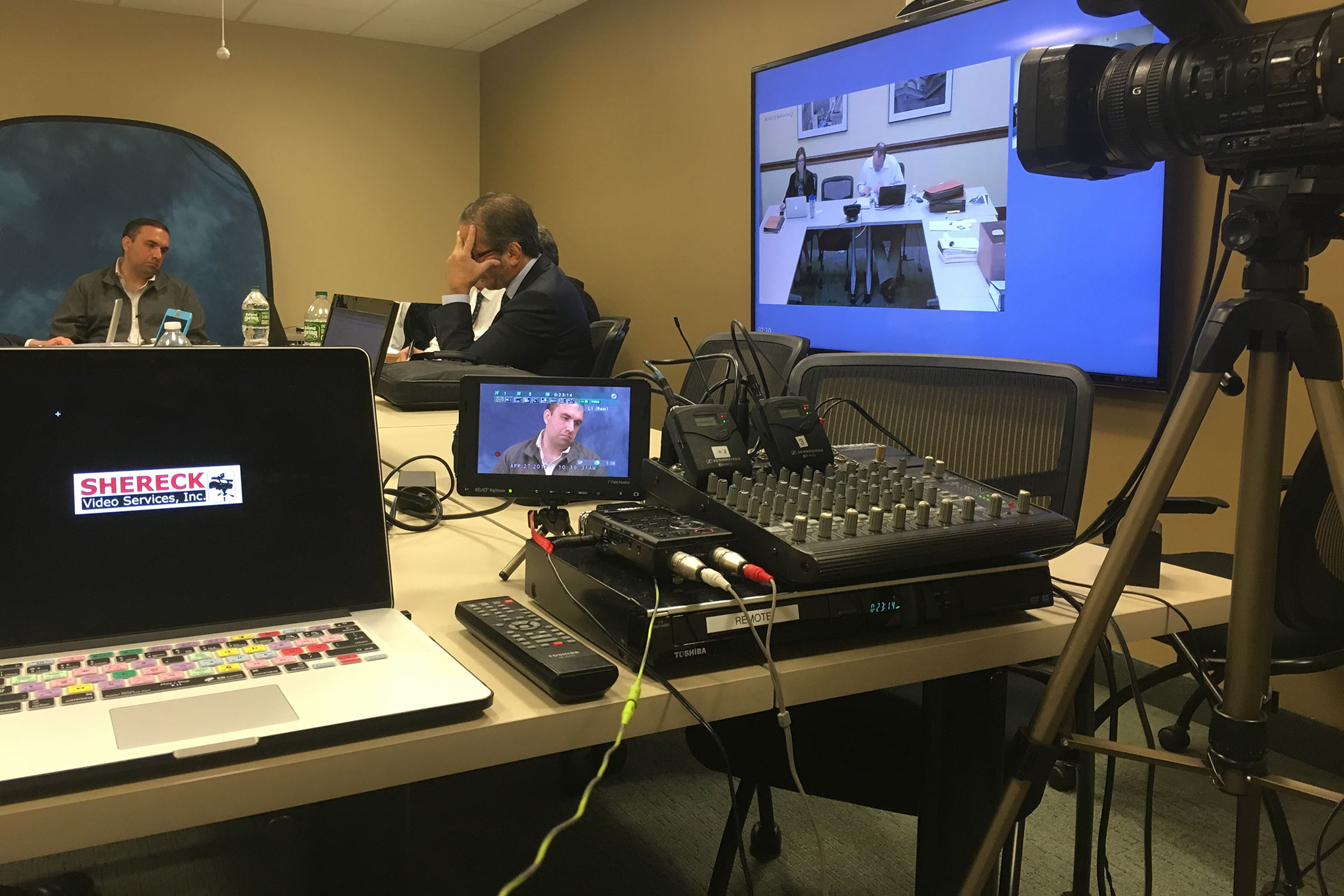Exploring the Different Types of Legal Videographers and Their Special Offerings
Legal videographers play an essential duty in the judicial procedure, each specializing in distinct elements of court paperwork. Their knowledge ranges from catching witness statements to improving trial presentations. Recognizing the diverse offerings of these professionals can brighten their payments to legal process. As the intricacies of modern-day lawsuits expand, the significance of their functions becomes increasingly evident. What certain functions do these videographers offer, and just how do they affect the end results of instances?
Comprehending Legal Videography
Legal videography plays a vital function in the judicial procedure, supplying aesthetic paperwork that can enhance the quality and accuracy of legal proceedings. This specialized field entails catching video recordings of numerous legal events, such as trials, hearings, and other substantial moments within the legal system. Legal videographers make use of sophisticated tools and methods to ensure high-grade footage, which can work as vital evidence throughout litigation.Understanding legal videography requires identifying its value in conveying information in an aesthetic format. The taped footage can aid juries and judges better recognize the context and nuances of testaments and events, potentially influencing decisions. Additionally, legal videographers should abide by stringent guidelines and standards to maintain the stability of the recordings. Their work not just aids in protecting a detailed account of procedures yet also adds to the total transparency and responsibility within the legal structure, guaranteeing that justice is served efficiently.
Deposition Videographers
Deposition videographers play a necessary role in legal process by taping witness testimonies for future reference. They make use of specialized tools and techniques to guarantee top notch video clip documents that accurately catches the subtleties of each deposition. Understanding their techniques and the relevance of their job can boost the performance of legal discussions.
Role in Legal Procedures
While commonly forgotten, the duty of videographers in legal process is crucial, particularly during depositions. These professionals document witness testimonies, recording both verbal and non-verbal hints that can be critical in court. Their recordings act as an accurate representation of the deposition, providing a trustworthy referral for lawyers and juries. Videographers guarantee that the environment is specialist, minimizing interruptions and adhering to legal criteria. They are educated to manage different situations, including unanticipated interruptions or technical troubles, safeguarding the honesty of the taped material. Additionally, the visibility of a videographer can discourage evasive actions from witnesses, promoting even more candid responses. On the whole, their payments significantly boost the clearness and effectiveness of legal process.
Devices and Techniques Utilized
The equipment and methods made use of by deposition videographers are crucial for producing top quality recordings that properly catch witness testaments. Professional-grade electronic cameras, commonly with 4K resolution, assurance clear visuals, while high-fidelity microphones capture sound without distortion. Videographers typically utilize tripods for security and lighting devices to improve visibility, particularly in less-than-ideal setups. Strategies such as mounting the witness correctly and preserving proper angles are vital for conveying body language and expressions. Several deposition videographers also utilize digital editing and enhancing software application to enhance the end product, ensuring quality and comprehensibility. In addition, they might incorporate time-stamping and annotations during post-production to facilitate recommendation throughout legal proceedings, inevitably providing a complete and dependable record of the deposition.
Trial Presentation Videographers
Trial presentation videographers play a vital role in court settings by efficiently imagining evidence and improving the narration procedure. Using sophisticated innovation and specific devices, they develop engaging presentations that assist juries and courts comprehend complex information. Their know-how in efficient storytelling techniques further raises the effect of legal arguments throughout tests.
Function in Court Settings
Frequently, legal videographers play a crucial function in courtroom settings by recording and offering aesthetic evidence that enhances the quality of legal disagreements. These experts focus on documenting witness testaments, depositions, and essential proof, guaranteeing that the proceedings are accurately recorded for future referral. Their work not just aids in the prompt presentation of cases yet likewise acts as a useful resource throughout charms or reviews. Test presentation videographers thoroughly compile and modify video footage to create engaging aesthetic narratives that lawyers can utilize to persuade discretionary. By integrating aesthetic elements into the trial, they considerably contribute to the general performance of the legal process, facilitating a much more enlightened decision-making atmosphere within the courtroom.
Technology and Devices Made Use Of
Modern test presentation videographers rely upon sophisticated technology and customized equipment to efficiently record and existing proof in the courtroom. High-definition electronic cameras are frequently utilized to assure that every information is taped with quality, while multiple video camera angles can improve the visual story. Videographers regularly utilize wireless microphones to capture clear audio from witnesses and attorneys, lessening disturbances. Additionally, advanced software application devices enable real-time modifying and smooth integration of video clips, images, and shows throughout discussions. Projectors and huge screens are commonly employed to present web content in an interesting fashion, making certain that jurors and courts can conveniently adhere to the procedures. This combination of technology and devices is important for producing impactful court presentations that facilitate understanding and retention of details.
Efficient Storytelling Methods
Capturing top quality video clip and sound is simply the beginning for test presentation videographers; effective narration techniques play a pivotal duty in communicating intricate legal narratives. These specialists utilize different strategies to improve the clarity and effect of the material provided. By thoroughly structuring the aesthetic and audio elements, they create a meaningful circulation that overviews jurors with the facts of the situation. Making use of methods such as thematic framework, sob story, and rational development, they emphasize crucial factors and bolster the total disagreement. In addition, integrating visuals, such as representations or computer animations, can simplify elaborate concepts and keep the target market involved. Ultimately, trial Continued presentation videographers change raw footage right into engaging tales that reverberate with jurors, helping with educated decision-making in the courtroom.
Video Evidence Experts
Video clip proof specialists play a crucial duty in the legal procedure, ensuring that visual recordings are precisely caught, preserved, and presented in court. These experts are educated to deal with a selection of videotaping equipment and strategies customized especially for legal setups. They concentrate on obtaining high-grade recordings that can withstand scrutiny, sticking to rigorous methods to maintain the integrity of the evidence.Often associated with the paperwork of criminal offense scenes, depositions, and witness statements, video evidence specialists are proficient in producing video footage that is both clear and trustworthy. They are likewise experienced regarding legal requirements and requirements, ensuring that their job adheres to administrative laws. Furthermore, these specialists might help in the post-production process, editing and format video clips for finest discussion. Their proficiency help attorneys in effectively sharing their situations, making the role of video clip proof experts important in the search of justice.
Court Videographers
While the courtroom usually acts as the stage for important legal process, court room videographers ensure that these minutes are documented with accuracy and clarity. Their key duty is to catch all aspects of a trial, consisting of witness statements, opening up and shutting declarations, and jury reactions. Making use of specific tools, courtroom videographers guarantee that audio and video clip high quality fulfill the standards needed for legal documentation.These professionals are experienced at the office unobtrusively within the court setting, navigating with the essential procedures and keeping the integrity of the legal process. They usually collaborate carefully with lawyers to understand particular requirements, ensuring that important aspects are tape-recorded for future reference.Furthermore, court room videographers play an important function in maintaining the credibility of the proceedings, providing an indispensable source for allures or further legal actions. Their competence warranties that all tape-recorded product functions as a trusted account of the court room occasions for all events involved.

Post-Production Providers and Editing And Enhancing

After the court proceedings are videotaped, the focus moves to post-production services and editing, which play a substantial function in improving the caught product. Legal videographers utilize specialized software application to enhance video top quality, guaranteeing quality and professionalism and reliability. This phase often consists of shade adjustment, audio improvement, and the elimination of any supplementary video, creating a meaningful story that straightens with legal standards.Additionally, videographers may integrate graphics, comments, or captions to give context or highlight vital details. The editing process also involves organizing the video footage chronologically or thematically, making it less complicated for legal groups to reference specific segments during tests or depositions. Furthermore, legal videographers commonly prepare last edits in numerous layouts to suit various try here systems and usages, making certain access for all stakeholders involved. Eventually, efficient post-production services are important for producing premium legal videos that sustain the case handy.
Regularly Asked Concerns
What Certifications Should I Search for in a Legal Videographer?

How Do Legal Videographers Ensure Video Top Quality and Reliability?
Legal videographers ensure video top quality and reliability with high-def tools, careful illumination, and sound administration - legal videographers. They also comply with legal requirements, make use of back-up systems, and conduct extensive pre-production preparation to minimize potential problems throughout recordings
What Tools Do Legal Videographers Typically Utilize?
Legal videographers normally make use of high-def cameras, tripods for stability, external microphones for clear audio, and illumination equipment to improve exposure. They may likewise utilize modifying software program to guarantee sleek and specialist end products read more for legal process.
How much time Does the Editing And Enhancing Refine Normally Take?
The modifying process for legal videographers normally varies, varying from a couple of hours to numerous days. Variables such as video clip complexity, needed quality, and particular client demands substantially affect the general time commitment required for conclusion.
Are Legal Videographers Accustomed To Court Room Rules?
Legal videographers normally possess a strong understanding of court room rules - legal videographers. Their training commonly includes knowledge of etiquette, equipment positioning, and regard for legal proceedings, guaranteeing their job aligns with the official environment of the courtroom
Comments on “What lawyers should know about working with legal videographers for admissible evidence”